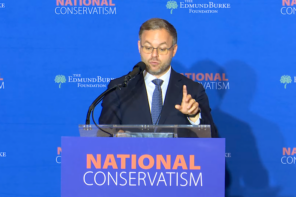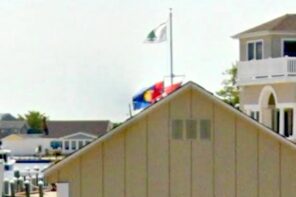It is night over Tehran, and the calls of Allahu-Akbar roll down from the rooftops in antiphony. Only, these are not odes to the Islamic revolution, but the rallying cries of the resistance movement that burst upon the world’s consciousness last month. “God is great” is accompanied not by “Death to America” but “Death to the dictator.” In truth, if the Green Revolt is about Allah at all, it is a vote of no confidence in his ability to govern. The aim that unites the broad constituency of students, trade unionists, and women’s rights advocates is the categorical rejection of the clerical autocracy and its replacement by a secular democracy that respects universal human rights.
Although prior to last month it seldom graced the tickers of CNN or the pages of the New York Times, popular resistance to the Islamic regime has existed since the moment Ayatollah Khomeini introduced the veil, escalating dramatically since 1999. This week Iranians everywhere are commemorating the 10th anniversary of brutal college dormitory raids by regime forces on July 9, or 18 Tir in the Persian calendar.
What exactly is it they are fighting for? Freedom and democracy, yes. But freedom is an idea. It always comes down to Earth in the form of some simple thing we love. Like being able to play the song we want to hear.
Below the rooftops, in private homes and dormitories, sometimes in gardens and parks, there is another sound: the crackle of electric guitars, the concussion of trap sets and plosives of rhymes spit in Persian; a vibrant underground music scene involving hundreds, perhaps thousands of bands making rock, “indie,” hip hop, jazz, and blues (some collections can be found at found at Bar-Ax).
This scene is underground in the gravest sense. Certain forms of music are not just discouraged but actively suppressed by authorities. Participants risk harrassment and imprisonment by a regime that routinely tortures dissidents. In May 2009, a heavy metal concert in Shiraz was raided by Islamist militia who arrested over 100 people on grounds of immorality (drinking alcohol) and “devil worship.”
Why this suspicion of music? After all, Islam’s sacred texts say nothing on the subject (although some conservative scholars may appeal to an injunction against “idle talk” in the Hadith). I asked Babak Khiavchi and Arash Sobhani, two members of the rock band Kiosk, who started in a Tehran basement and have since landed in Seattle.
“The old justification used to be that anything that promotes ‘decadent Western culture’ was considered a form of cultural attack against Islam from the West and therefore banned,” they told me. “Many bands who fused classical Persian poetry from Hafez and Rumi with rock music were denied permission to publish or perform because of the ‘temptation’ caused by their music. But the current situation is that the entire music industry in Iran is run by the Lalezar mafia, which is tied to the Ershad (Ministry of Islamic Guidance) and Seda Sima (state-run TV and radio). If they do not have any control or do not profit from the music works, they will either block it from being released or will not promote it at all.”
“The music and lyrics, and their combination must get permission from Ershad before they are allowed to be recorded or published,” they continued. “The lyrics are of course more sensitive, and many lyrics do not get approved for publishing for no particular reason. That’s why we have seen a surge of instrumental music in Iran, and as a result amazing musical talents have been emerging from the Iranian underground music scene in blues, jazz, heavy metal, and many other genres.”
Women face an addition barrier as they’re banned from solo vocal performances (except in front of all-female audiences). This extends even to traditional and classical music. What toll do such conditions take on creativity? Again, the duo from Kiosk:
“By not being able to perform or record, musicians are financially under pressure. They all have to work several jobs to make ends meet, leaving less time for them to devote to their passion. The fact that you cannot perform or write music that you believe in, and cannot express yourself freely in your own country, using your own language, has a devastating emotional effect.“
“Many artists have tried to work with the loopholes in the system, or to adjust themselves to the restrictions, but there are no clear guidelines or visible red lines to look out for, you just know they exist. Overall we are no better off than we were 10 years ago in terms of self-expression as artists.”
Arash and Babak locate Iranian rock in the long historical arc of the Arab conquest of Persia and the imposition of Islam on Zoroastrian culture in the 7th century: “The cultural struggle still continues, and with it comes the censorship, but Iranians will never give up their rich Persian heritage and change their identity.”
One great oral tradition that survived was the ancient epic poem Shahnameh, or Book of Kings. Its verses could be heard recited in coffee houses by professional storytellers called naqqali—literally, a transmitter. As my tireless activist friend Banafsheh points out, the Persian rapper might just be the new naqqali [see video below].
The members of Kiosk hope that their work will support their fellow musicians back home. Already numerous songs dedicated to the recent uprising have been recorded and circulated online. “At all the demonstrations and rallies, songs like ‘Yare Dabestani Man’ [‘My fellow schoolmate’] and ‘Ey Iran’ are being sung with the sense of a new meaning and more power in the lyrics. Music gives hope, it unites and helps people find ways to express themselves, and with a country that is taken hostage by the regime, music gives them a voice.”
Ultimately, what Iran’s underground musicians are striving for is the freedom—the luxury—to be apolitical if they choose, to sing about their hook-ups, break-ups, and crack-ups without being enlisted into any ideological struggle whatever. It’s nothing more than what young people everywhere want: to make a joyful noise.
To get a feel for some of the music, here is one of “the new naqqali,” Persian rapper Deev, followed by Iranian indie band, Take It Easy Hospital:




